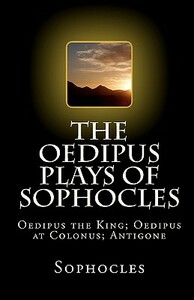Take a photo of a barcode or cover
547 reviews for:
The Oedipus Plays of Sophocles: Oedipus the King; Oedipus at Colonus; Antigone
Sophocles
547 reviews for:
The Oedipus Plays of Sophocles: Oedipus the King; Oedipus at Colonus; Antigone
Sophocles
So, I have always been rather fond of Greek tragedy as a whole but this piece takes the cake for awesome. Though Sophocles employes less grand artistry than Aeschylus and less description that Euripides, his pacing of the plot is phenomenal, and the truths about reality and morality are some of the grandest and best-portrayed in literature. And, this was the third book that I shed actual tears over. That's proof that the 'old dead guys' can be just as relateable and moving as modern stuff.
adventurous
reflective
medium-paced
Plot or Character Driven:
A mix
Strong character development:
Yes
Loveable characters:
Complicated
Diverse cast of characters:
No
Flaws of characters a main focus:
Yes
Antigone, Blood Ties, and Mania
Blood ties are the most difficult bonds to break, making them the most powerful. In most cases, familial love is a person’s first exposure to love. It unconsciously sets an example of what love should and shouldn’t be in one’s head. Once implanted, these notions are hard to break. Even once unhealthy tendencies are recognized, one still has to admit that they are rooted in more unfavorable aspects of their family dynamics. Despite all the strife and turmoil Antigone’s family has endured and inflicted upon each other in The Three Theban Plays, Antigone still holds love for all of them. She declares, “I was born to join in love, not hate— / that is my nature” (Antigone 590). And she does indeed go above and beyond for love, proving familial love is the most powerful because of the deep roots it has in a person. Her love is enduring and strengthening, a mixture of genuine affection, duty, and near the end, mania.
Although Antigone takes care of Oedipus out of genuine love, her interactions with her sister, Ismene, make it clear that it has also become an obligation. In the play Antigone, Antigone insists on burying her brother Polynices, despite the king forbidding it. She approaches Ismene and asks her to “share the labor, share the work” (61). When Ismene refuses, Antigone is cold towards her for the rest of the play, stating, “I have no love for a friend who loves in words alone” (612). The underlying idea is that a person has to prove their love, and Oedipus was the one to instill this idea in Antigone. His dying words to her were, “one word alone repays you / for the labor of your lives—love, my children” (1829-30). In this quote, as well as throughout Oedipus at Colonus, he implies that his love is conditional, that Antigone has to work for it. She doesn’t understand why Ismene isn’t willing to go to extremes to demonstrate her love because she believes extremes are the only way to love.
Fundamentally, Antigone is strengthened by love. She does rather impressive stunts for her family, such as dedicating a large part of her life to Oedipus’ care, and sacrificing herself in order to bury Polynices. Creon and Oedipus both compare her to a man (Antigone 541-42, Oedipus at Colonus 1548-49) while describing her strength and stubbornness. The problem lies within her love being horribly misplaced. Oedipus’ lineage was doomed from its incestuous start. Ismene recognizes this, and while she still cares for her family, she is reluctant to go above and beyond for them. Contrastingly, Antigone is unmoving in her dedication. Her family is a rowboat with holes that she is determined to get to shore, even as it’s halfway underwater. Her fierce loyalty to her family strengthens her, but it also blinds her to their wrongs. It gives her a close-minded perspective, ultimately setting her up for destruction in her play. Antigone proves that familial love is the most powerful type of love, but not necessarily the most admirable.
challenging
Oedipus the King has always been one of my favorite plays, and I absolutely adored reading Antigone for the first time. The final play was a bit anticlimactic for me, but still incredibly haunting.
dark
funny
fast-paced
Plot or Character Driven:
A mix
Strong character development:
Complicated
Loveable characters:
Yes
Diverse cast of characters:
N/A
Flaws of characters a main focus:
Yes
Read this for a class on tragedy. My professor's interpretation is that the whole thing is a critique of dynastic rule, that the horrible things that happen to Oedipus' family are a representation of the self-destruction inherent in tying the existence of a state in with the rule of a single family. Pretty fascinating.
Also, beware the Sphinx's riddle. It is everywhere in these plays
Also, beware the Sphinx's riddle. It is everywhere in these plays
medium-paced
Plot or Character Driven:
A mix
Strong character development:
Yes
Loveable characters:
Complicated
Diverse cast of characters:
Complicated
Flaws of characters a main focus:
Yes
"The gods do not praise Antigone, nor does anyone else in the play - except a young man who loves her so passionately that he cannot bear to live without her."
Ismene: How can I live alone, without her?
"The last play is still tragic in its outcome - Oedipus dies, Polynices and Antigone are doomed - but in it, for one man and for one moment, the silent gods speak, and the gulf between human and divine is bridged."
Antigone: O you wanted to die on foreign soil, but so alone, so desolate - why not in my arms?
adventurous
dark
mysterious
tense
slow-paced
Plot or Character Driven:
Character
Strong character development:
Yes
Loveable characters:
Complicated
Diverse cast of characters:
N/A
Flaws of characters a main focus:
Yes
adventurous
dark
funny
reflective
tense
medium-paced
Plot or Character Driven:
A mix
Strong character development:
Complicated
Loveable characters:
No
Diverse cast of characters:
Yes
Flaws of characters a main focus:
Yes
I think I really do enjoy reading plays lol. I love them actually.
This E.F. Watling translation is a pretty decent translation of Sophocles' Oedipus trilogy/The Theban Plays. I'd years ago read a different translation and had a hard time getting through that one but these one seems pretty good. For all that, the most famous of the three plays, Oedipus Rex (or King Oedipus as it's titled in this edition) actually seems to be the worst of the three; there are parts where the dialogue seems overblown and full of bluster, taking longer than necessary to reach the conclusion that most people (and the original audience) already would have known to be coming. Antigone is pretty good although, as we'd never seen Antigone's betrothed before he enters the scene, his storyline doesn't feel as moving as it could be if we'd known they were engaged prior. Oedipus at Colonus is also pretty good; it falls between the two plays in quality as well as storyline (more blustery than Antigone but not near as blustery as Oedipus Rex, likewise more succinct than Oedipus Rex but not as succinct as Antigone) though it was written last.






